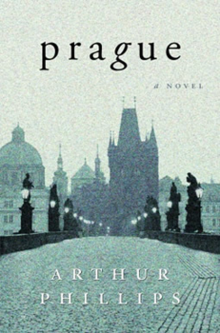Prague (novel)

Cover of the paperback version of the novel.
|
|
| Author | Arthur Phillips |
|---|---|
| Cover artist | Barbara M. Bachman |
| Country | United States |
| Language | English |
| Genre | Historical novel |
| Publisher | Random House |
|
Publication date
|
2002 |
| Media type | Print (Hardback & Paperback) |
| ISBN | (first edition, hardback) |
Prague is a historical novel by Arthur Phillips about a group of North American expatriates in Budapest, Hungary circa 1990, at the end of the Cold War. Prague is the author's debut novel, first published by Random House in 2002. In 2003, the novel won The Los Angeles Times/Art Seidenbaum Award for Best First Fiction.
Prague opens on the afternoon of May 25, 1990 with five North American expatriates living in the city of Budapest. The expatriates are, for the most part, optimistic about their prospects in the Central European city. John Price seeks a reconciliation with his older brother, Scott, who has come to Budapest to separate himself from his earlier life in the United States. Emily Oliver, an idealistic worker at the American Embassy, hopes to begin a distinguished diplomatic career. Mark Payton, a Canadian researching a history of nostalgia, relishes the chance to be immersed in a place with interesting history. Only Charles Gábor, a Hungarian-American venture capitalist who resents his co-workers and has contempt for his fellow Magyars, displays any pessimism at the story's outset. The five young expatriates enjoy the nightlife and new opportunities in the historic city.
John is instantly attracted to Emily, and plots to win her love, but she ignores him. He finds a job as a columnist for an English-language newspaper, BudapesToday. Still a virgin at the age of 24, he is initiated by his co-worker Karen, but finds the experience to be quite anticlimactic. He later commits "fradultery" with his brother's future wife, Mária.
Part II presents the complex history of the Horváth Kiadó (Horvath Press), a family-run publishing company – which also serves as a history of Budapest from the early nineteenth century to the present day. Presently, the head of the publishing house is Imre Horváth, who until recently had been exiled in Vienna. In the mid-nineteenth century, during the Revolution, the Horváth business is affected by the April Laws, a collection of laws legislated by Lajos Kossuth with the aim of modernizing Kingdom of Hungary into a nation state. During the Communist regime, the Horváth Kiadó was a state-owned enterprise; after the fall of communism, it is due to be privatized. Imre seeks an investment from Charles' venture capital firm in order to buy the press's assets and restart it in Budapest.
...
Wikipedia
